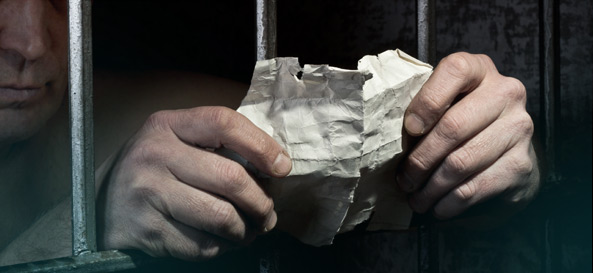
When I first read Nathan Ybanez’s writing on a blog, his graceful use of words and incredible insight into humanity floored me.
In a post titled “Words,” he writes, “How did words come to have such power? These angled lines scribbled on my paper and pixilated on your screen? In a sense, words are the power of the past. […] Maybe I’m a dreamer to think we can now have words and experiences that are not stained in the past. That means we can speak together, here and now, in the present moment. Then again, maybe it’s already happened.”
Nathan is now my pen-pal. I have learned more from him than from people who have Ph.D.s in philosophy or who have travelled the world. He leads a poetry club and mastered the art of meditation. He is knowledgable, helpful and kind.
He is also a murderer.
He grew up with an emotionally distraught and sexually abusive mother, and when he was 16, he lost control of his emotions during an argument and killed her. He was sentenced to life in prison without the chance of parole.
I first heard of Nathan through a PBS documentary called When Kids Get Life, and was touched by the unfairness of him being sentenced to life behind bars as a minor, which is a rare occurrence in our justice system.
But even with my sympathy toward his plight, when I first wrote to Nathan—introducing myself, asking how he was, inquiring about what goes on inside prisons—I was guarded. A part of me thought maybe he had been indoctrinated into the prison system for so long that he had become a callous, manipulative criminal. Maybe he would try to cajole me into sending him money or capitalize on my sympathy.
But after a few exchanges, I realized he would do none of those things. Nathan is candid and to-the-point, yet always respectful. He and I have discussed religion, morals, and ethics, and we don’t always agree, but not once have I sensed a hostile or judgmental tone. He has helped me sort out some of my life’s problems (though they pale in comparison to his own) and genuinely cares that I take advantage of all the opportunities he was never offered and may never get to see.
Through my interactions with him, I realized that Nathan is far more than the crime he has committed. This is a man who, in conditions that should breed hate, exudes love.
It’s a rare glimpse into the humanity of prisoners that most of us never get. On the face of it, when we hear about crimes like the one Nathan committed, it’s easy to say the perpetrators got what they deserved, and leave it at that, never giving them another thought.
Indeed, with 2.2 million other people in prisons across the country, it seems our criminal justice system has a love affair with locking people up and throwing away the key.
Done. Justice has been served.
As a Christian, I often find myself conflicted; I can’t help that smug feeling of satisfaction when an alleged killer is given a hefty prison sentence—they’ve committed a crime, so that’s what they deserve, right?
However, the Bible makes it very clear to avoid such celebratory feelings, as in Romans 12:17: “Repay no one evil for evil, but give thought to do what is honorable in sight of all.” It is incredibly difficult to love kidnappers, killers and rapists, but, as Christians, we cannot fall into the trap of believing they are all monsters and their sins are unforgiveable.
After all, from a spiritual perspective, we are not all that different from these inmates. “Whoever keeps the whole law but fails in one point has become accountable for all of it” (James 2:10). Without accepting Jesus, all of us are given the same punishment as murderers because God views all of our sins as equal.
Does that sound fair to you? It certainly doesn’t to me. But who are we to decide what justice truly is? The only thing we are called to do is love, and while it’s easy to love cute puppies and little children, the biggest test of our grace comes by loving those who commit even the worst atrocities.
So how can we show love to our prisoners? One of the simplest ways is by fighting ignorance and educating ourselves about what happens beyond that barbed wire fence. So many tactics employed by our “corrections” system are inhumane and in desperate need of reform.
While we are educating ourselves, many inmates are also seeking to educate themselves. They take classes and work towards degrees just like their civilian counterparts. However, books are expensive for them and hard to come by. Many nonprofit organizations—such as the Prison Book Program and the Women’s Prison Book Project—collect donated books and distribute them to inmates across the country. If you have some new or gently used books lying around, perhaps you could consider donating them to charities like these to help prisoners. In this way, we can support the prisoners who seek to better themselves.
If you feel called to help an inmate more personally, consider making a prison pen-pal. Prisoners seek friendship just like any other human being, and some have gone years without hearing their name on mail call. You might find it to be mutually rewarding.
If you don’t want to commit to a pen-pal, consider sending an inmate a birthday card on his or her birthday or a Christmas card during the holidays. It doesn’t have to be much, just enough to let the inmate know he or she is not forgotten.
Lastly, many churches have prison ministries where they may conduct worship services in prisons, lobby for prison reform and provide ministry to families of the inmates, in addition to connecting people with pen-pals and distributing educational information. See if your church has a prison ministry and get involved. If your church lacks one, see if there is a way you could start promoting awareness about the condition of our prisoners.
It’s easy (and convenient) to simply forget or ignore the existence of prisoners entirely. And when we do think about them. we may be indignant about the sins they’ve committed, but we must refrain from seeking vengeance. Instead, we need to show love and grace, just as Jesus showed love to the criminal being crucified on the cross next to Him.
It can be tempting to think prisoners gave up their chance to receive God’s grace when they committed a crime we find atrocious, but the justification and acceptance we get through Jesus is bigger and more powerful than we think. Big enough to cover all our sins. Big enough to cover Nathan’s murder.
Inmates are God’s children, just like us, and He has not abandoned them, so neither should we.





















